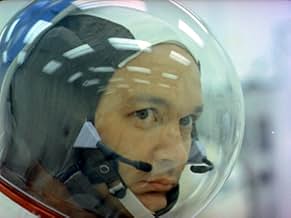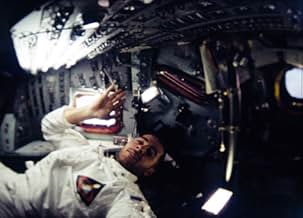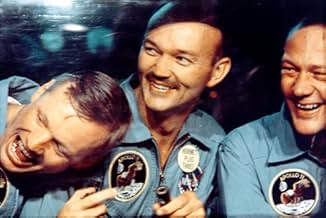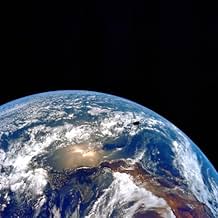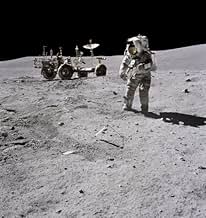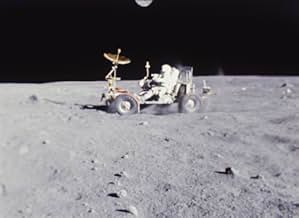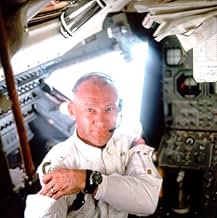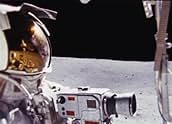Agrega una trama en tu idiomaThe crew members of NASA's Apollo missions tell their story in their own words.The crew members of NASA's Apollo missions tell their story in their own words.The crew members of NASA's Apollo missions tell their story in their own words.
- Premios
- 6 premios ganados y 13 nominaciones en total
Jim Lovell
- Self
- (as James Lovell)
Edgar D. Mitchell
- Self
- (as Edgar Mitchell)
Dave Scott
- Self
- (as David Scott)
William Anders
- Self
- (material de archivo)
Neil Armstrong
- Self
- (material de archivo)
Stephen Armstrong
- Self
- (material de archivo)
Viola Armstrong
- Self
- (material de archivo)
Jules Bergman
- Self
- (material de archivo)
Frank Borman
- Self
- (material de archivo)
Roger B. Chaffee
- Self
- (material de archivo)
Yuri Gagarin
- Self
- (material de archivo)
Opiniones destacadas
I don't admit this to too many people, but the single most significant historic event I have ever "witnessed," was watching the first lunar landing as it happened, on television, as a ten year old kid. Okay, maybe there was a thirteen-second delay, but I was right there with those guys-- my heart pounding, skipping a beat every time Uncle Walter (a.k.a. Walter Cronkite, the most trusted man in America) interjected his incomparably eloquent journalistic commentary. But even Cronkite couldn't suppress his awe as mankind's greatest achievement unfolded before our eyes.
The documentary, "In the Shadow of the Moon," directed by David Sington, and presented by Ron Howard (who partnered with ThinkFilm to help usher the project to completion), is not only a romantic, dramatic, suspense-filled fantasy to behold, it grips you with deep emotion and vests you with our heroes through every sequence of their quest. And it's all real.
Without a single frame of CGI or simulation, the filmmakers compiled astounding, never-before seen footage with inserts of intimate confessions by some of the remaining Apollo crew members who took part in the nine moon landings. "Shadow" shows just part of how the work of 400,000 scientists and engineers came together to make President Kennedy's dream of putting a man on the moon by the end of the decade, a reality. These are parts worth seeing.
"The extraterrestrial film footage, shot by the astronauts themselves, has been brought out of storage only a handful of times since the sixties and seventies," Chris Riley, the film's co-producer explains. Considering that there may not be any more footage shot on or from the moon by an actual human, again in our lifetime, this film is very precious indeed.
"In the Shadow of the Moon" effectively evokes that brief time in late-20th century America when we thought that the government was doing something right. This documentary puts a human face-- and soul-- into those bulky space suits, and let's us know what it was really like to be on those harrowing missions.
Command module pilot Michael Collins admits to having being excited, but not fearful. At times, mostly worried-- that all the machinery would work as planned. The documentary reveals a few of those times the machines didn't, or almost didn't work. And startlingly, how much "luck" played a part in the operations. "Shadow" nearly gives us a first-person experience of how a body feels, what the physical sensations of being shaken, slammed, and thrust-- first off the ground, then through the atmosphere, finally into the eerie calm and quiet of space. The men talk of how they felt a fool's complacency, if only for a second, after a rocket stage would break away and fall to earth, until anticipation of the next stage's violent expulsion reminded them that it too, would detach as planned, or explode killing them all. It makes the Space Mountain ride at DisneyWorld sound like a massage.
Although Neil Armstrong, known to be somewhat of a recluse, does not make an appearance, he is certainly there in spirit. His fellow crew members make it known they felt he was the right choice for the first man out. That he was preternaturally calm under pressure, they concur. Recollecting how Armstrong delivered those poignant first words as he descended the steps of the LEM, and how it might have been more tempting for them to simply yell, "Whoopee! I did it!" But Buzz Aldrin asserts that he also holds a record for a lunar first. In one of the many hilarious moments in the film, his feat is captured on video as proof.
Most of the men who went on the Apollo moon missions tell in this film, of the moment while in space, viewing the galaxy from a perspective very few of us will ever see, they experienced the profound realization of their own insignificance, while comforted with a certainty of infinite connectivity with the very stuff of the universe. Contrast that with the "hero's parades" and instant celebrity into which they were violently thrust upon return to terra firma. Additionally, some of the astronauts confess the guilt they felt, knowing that many of the pilots and friends they had trained and served with, were being "shot at, shot down, and were fighting for their country" in Viet Nam.
Some might have viewed America's race to the moon was little more than a diversion, cleverly orchestrated by government propagandists, from the colossal turmoil of the times. Others, saw it as a symbol of hope-- that there was something greater beyond our mere earthly squabbles.
Watching this film reminded me of what America is capable-- how much can be accomplished in the interest of science, ecology, or the most human of natures, curiosity-- not to be underrated. Present and future resources, research, and funding if thoughtfully channeled, just might be able to find alternate sources of energy, cure cancer, and save the planet from ecological disaster.
President Kennedy foresaw that the way out of the Post-War confusion and the Cold War paranoia, was to coach us back to the top of our game. Just a few years before what would eventually become the debacle of Viet Nam, this was perhaps one of the last times America truly was champion of the world. Getting to the moon made us feel like winners. We were proud. I still am.
The documentary, "In the Shadow of the Moon," directed by David Sington, and presented by Ron Howard (who partnered with ThinkFilm to help usher the project to completion), is not only a romantic, dramatic, suspense-filled fantasy to behold, it grips you with deep emotion and vests you with our heroes through every sequence of their quest. And it's all real.
Without a single frame of CGI or simulation, the filmmakers compiled astounding, never-before seen footage with inserts of intimate confessions by some of the remaining Apollo crew members who took part in the nine moon landings. "Shadow" shows just part of how the work of 400,000 scientists and engineers came together to make President Kennedy's dream of putting a man on the moon by the end of the decade, a reality. These are parts worth seeing.
"The extraterrestrial film footage, shot by the astronauts themselves, has been brought out of storage only a handful of times since the sixties and seventies," Chris Riley, the film's co-producer explains. Considering that there may not be any more footage shot on or from the moon by an actual human, again in our lifetime, this film is very precious indeed.
"In the Shadow of the Moon" effectively evokes that brief time in late-20th century America when we thought that the government was doing something right. This documentary puts a human face-- and soul-- into those bulky space suits, and let's us know what it was really like to be on those harrowing missions.
Command module pilot Michael Collins admits to having being excited, but not fearful. At times, mostly worried-- that all the machinery would work as planned. The documentary reveals a few of those times the machines didn't, or almost didn't work. And startlingly, how much "luck" played a part in the operations. "Shadow" nearly gives us a first-person experience of how a body feels, what the physical sensations of being shaken, slammed, and thrust-- first off the ground, then through the atmosphere, finally into the eerie calm and quiet of space. The men talk of how they felt a fool's complacency, if only for a second, after a rocket stage would break away and fall to earth, until anticipation of the next stage's violent expulsion reminded them that it too, would detach as planned, or explode killing them all. It makes the Space Mountain ride at DisneyWorld sound like a massage.
Although Neil Armstrong, known to be somewhat of a recluse, does not make an appearance, he is certainly there in spirit. His fellow crew members make it known they felt he was the right choice for the first man out. That he was preternaturally calm under pressure, they concur. Recollecting how Armstrong delivered those poignant first words as he descended the steps of the LEM, and how it might have been more tempting for them to simply yell, "Whoopee! I did it!" But Buzz Aldrin asserts that he also holds a record for a lunar first. In one of the many hilarious moments in the film, his feat is captured on video as proof.
Most of the men who went on the Apollo moon missions tell in this film, of the moment while in space, viewing the galaxy from a perspective very few of us will ever see, they experienced the profound realization of their own insignificance, while comforted with a certainty of infinite connectivity with the very stuff of the universe. Contrast that with the "hero's parades" and instant celebrity into which they were violently thrust upon return to terra firma. Additionally, some of the astronauts confess the guilt they felt, knowing that many of the pilots and friends they had trained and served with, were being "shot at, shot down, and were fighting for their country" in Viet Nam.
Some might have viewed America's race to the moon was little more than a diversion, cleverly orchestrated by government propagandists, from the colossal turmoil of the times. Others, saw it as a symbol of hope-- that there was something greater beyond our mere earthly squabbles.
Watching this film reminded me of what America is capable-- how much can be accomplished in the interest of science, ecology, or the most human of natures, curiosity-- not to be underrated. Present and future resources, research, and funding if thoughtfully channeled, just might be able to find alternate sources of energy, cure cancer, and save the planet from ecological disaster.
President Kennedy foresaw that the way out of the Post-War confusion and the Cold War paranoia, was to coach us back to the top of our game. Just a few years before what would eventually become the debacle of Viet Nam, this was perhaps one of the last times America truly was champion of the world. Getting to the moon made us feel like winners. We were proud. I still am.
Saw this film at Sundance, the screening reserved for the Grand Jury World Documentary Award Winner. Wow! I have seen many of the preceding documentaries on the history of the American space program, the Apollo program in particular. Where this documentary exceeds all previous efforts was in revealing the humanity of the astronauts. Most other documentaries focus on the politics which motivated and technical hurdles overcome in the American space program. David Sington brilliantly uses only the astronauts voices for narration of facts and more with newly released footage from NASA, as well as a lot of footage we've all seen before. Because of the free rein given to the astronauts in the interviews, you see many sides of each revealed. For instance, Mike Collins (who has heretofore rarely been interviewed) reveals wonderful humor and joy in his accomplishments. You find out more about their worries and fears, how they look back on their work and what they were thinking at the time. They are all revealed as nice guys with whom you would want to spend an afternoon.
Strangely absent, but it works well in the end, was Armstrong. He gives virtually no interviews. In a way, having everyone else talk about him is maybe better than him talking.
And, the various conspiracy theories are dealt with in the end credits. This is a great place to do it. In films we sometimes see the end credits used for humorous out-takes, epilogue commentary, and so forth. By dealing with the conspiracy theories in an appended manner during the credits, the film refuses to elevate them to the level of legitimacy that the remainder of the facts and biographical material, yet still dismisses them. The single best dismissal is this: If it was all faked, why did they fake it so many times? Wouldn't once have been enough?
See this film when it comes to your neighborhood theater, as it has been announced as having a distribution deal. It is worth seeing on the big screen for its amazing visuals.
Strangely absent, but it works well in the end, was Armstrong. He gives virtually no interviews. In a way, having everyone else talk about him is maybe better than him talking.
And, the various conspiracy theories are dealt with in the end credits. This is a great place to do it. In films we sometimes see the end credits used for humorous out-takes, epilogue commentary, and so forth. By dealing with the conspiracy theories in an appended manner during the credits, the film refuses to elevate them to the level of legitimacy that the remainder of the facts and biographical material, yet still dismisses them. The single best dismissal is this: If it was all faked, why did they fake it so many times? Wouldn't once have been enough?
See this film when it comes to your neighborhood theater, as it has been announced as having a distribution deal. It is worth seeing on the big screen for its amazing visuals.
Powerfully put together NASA documentary highlights Apollo 11's historic run amongst other aged adventurers often stirring recollections.
Undoubtedly this is some of the finest public extraterrestrial footage ever married into film, and for that alone this noble salute to a bygone America and the heroes that inhabited it is a must see. Taking a trip to the moon with these brave astronauts has never been captured as intimately, helping viewers begin to feel what it must be like to be looking down from space like never before.
Combined with excellent musical scoring, David Sington's emotional remembrance and vicarious lift-offs belongs in many, many star watcher's collections.
Undoubtedly this is some of the finest public extraterrestrial footage ever married into film, and for that alone this noble salute to a bygone America and the heroes that inhabited it is a must see. Taking a trip to the moon with these brave astronauts has never been captured as intimately, helping viewers begin to feel what it must be like to be looking down from space like never before.
Combined with excellent musical scoring, David Sington's emotional remembrance and vicarious lift-offs belongs in many, many star watcher's collections.
This recently-released documentary had some fantastic footage in it, and a very personal look at many of the astronauts who went to the moon. Overall, that is a very exclusive club: only about a dozen men ever did it in the history of the world and just eight or nine ever stepped foot on it. Most of them are still alive and they discuss their adventures, insights and personal feelings here.
One gets the feeling that the rest of us will never know exactly how beautiful the moon is except to take the astronauts' words about it, because even the pictures on this DVD can't convey that. It just looks dull and gray, but the men say it was spectacular. I believe them.
Since this documentary is about 100 minutes long, you get a lot of information. You also get reminded how close two of the three men who went up on that historic first walk on the moon almost didn't get home alive.
A glaring absence in this documentary - through no fault of the film-makers, is the most famous astronaut of them all: Neil Armstrong, the first man to step foot on the moon! Apparently, he did not want to be part of this film. One of the astronauts, near the very end of this documentary, mentions something briefly about Armstrong being somewhat of a "recluse" now and it "being understandable with what he's gone through." From what I've read, a lot of people have tried to make money off him in shady ways and so now he's withdrawn from the public spotlight. Still, not having his thoughts on this historic mission is a real loss to this film and makes this story seem incomplete.
After a slow first half hour, this really picks up when we travel along with Armstrong's Apollo 11 crew. Seeing slow-motion pictures of the lift-off and great shots of the earth are just awesome. The worldwide reaction to the success of this mission will bring a tear or two to your eyes.
This film, a legacy to the Apollo program and the brave men who ran it, should be in every schoolroom. It would make history a lot more interesting to students.
One gets the feeling that the rest of us will never know exactly how beautiful the moon is except to take the astronauts' words about it, because even the pictures on this DVD can't convey that. It just looks dull and gray, but the men say it was spectacular. I believe them.
Since this documentary is about 100 minutes long, you get a lot of information. You also get reminded how close two of the three men who went up on that historic first walk on the moon almost didn't get home alive.
A glaring absence in this documentary - through no fault of the film-makers, is the most famous astronaut of them all: Neil Armstrong, the first man to step foot on the moon! Apparently, he did not want to be part of this film. One of the astronauts, near the very end of this documentary, mentions something briefly about Armstrong being somewhat of a "recluse" now and it "being understandable with what he's gone through." From what I've read, a lot of people have tried to make money off him in shady ways and so now he's withdrawn from the public spotlight. Still, not having his thoughts on this historic mission is a real loss to this film and makes this story seem incomplete.
After a slow first half hour, this really picks up when we travel along with Armstrong's Apollo 11 crew. Seeing slow-motion pictures of the lift-off and great shots of the earth are just awesome. The worldwide reaction to the success of this mission will bring a tear or two to your eyes.
This film, a legacy to the Apollo program and the brave men who ran it, should be in every schoolroom. It would make history a lot more interesting to students.
10se7en187
I saw this at the Traverse City Film Festival and it was quite the thrill.
Another great documentary about the Apollo program and the astronauts that went to the moon. Some very interesting and inspiring interviews including incredible actual footage of the Apollo 11 mission as it traveled from the Earth to the Moon.
The film contains interviews from many of the astronauts, Mike Collins (the astronaut from Apollo 11 that didn't walk on the moon) was probably the highlight, he was so funny and entertaining. I was a little disappointed that Neil Armstrong wasn't interviewed, but oh well, it was still very good.
Captivating, fun, and an excellent score, I'm sure people will enjoy this well made film.
Another great documentary about the Apollo program and the astronauts that went to the moon. Some very interesting and inspiring interviews including incredible actual footage of the Apollo 11 mission as it traveled from the Earth to the Moon.
The film contains interviews from many of the astronauts, Mike Collins (the astronaut from Apollo 11 that didn't walk on the moon) was probably the highlight, he was so funny and entertaining. I was a little disappointed that Neil Armstrong wasn't interviewed, but oh well, it was still very good.
Captivating, fun, and an excellent score, I'm sure people will enjoy this well made film.
¿Sabías que…?
- TriviaOf all the astronauts who appeared in the film, only Buzz Aldrin demanded to be paid.
- ErroresThe 1202 alarm was not a programming error in the Apollo Guidance Computer, but rather a hardware design bug, already documented by Apollo 5 engineers. Since the 1202 alarm had occurred only once during testing, NASA decided to go with the radar hardware with known problems instead of using untested newer alternatives with unknown problems.
- Citas
Jim Lovell: We changed our plans on Apollo 8. They changed the mission from an Earth orbital type to a flight to the Moon. And it was a bold move. It had some risky aspects to it. But it was a time when we made bold moves.
- ConexionesAlternate-language version of Universum: Im Schatten des Mondes (2009)
Selecciones populares
Inicia sesión para calificar y agrega a la lista de videos para obtener recomendaciones personalizadas
- How long is In the Shadow of the Moon?Con tecnología de Alexa
Detalles
- Fecha de lanzamiento
- Países de origen
- Sitios oficiales
- Idiomas
- También se conoce como
- Vùng Khuất Của Mặt Trăng
- Productoras
- Ver más créditos de la compañía en IMDbPro
Taquilla
- Presupuesto
- USD 2,000,000 (estimado)
- Total en EE. UU. y Canadá
- USD 1,134,358
- Fin de semana de estreno en EE. UU. y Canadá
- USD 38,281
- 9 sep 2007
- Total a nivel mundial
- USD 2,161,369
- Tiempo de ejecución1 hora 40 minutos
- Color
- Mezcla de sonido
- Relación de aspecto
- 1.85 : 1
Contribuir a esta página
Sugiere una edición o agrega el contenido que falta

Principales brechas de datos
By what name was In the Shadow of the Moon (2007) officially released in India in English?
Responda





